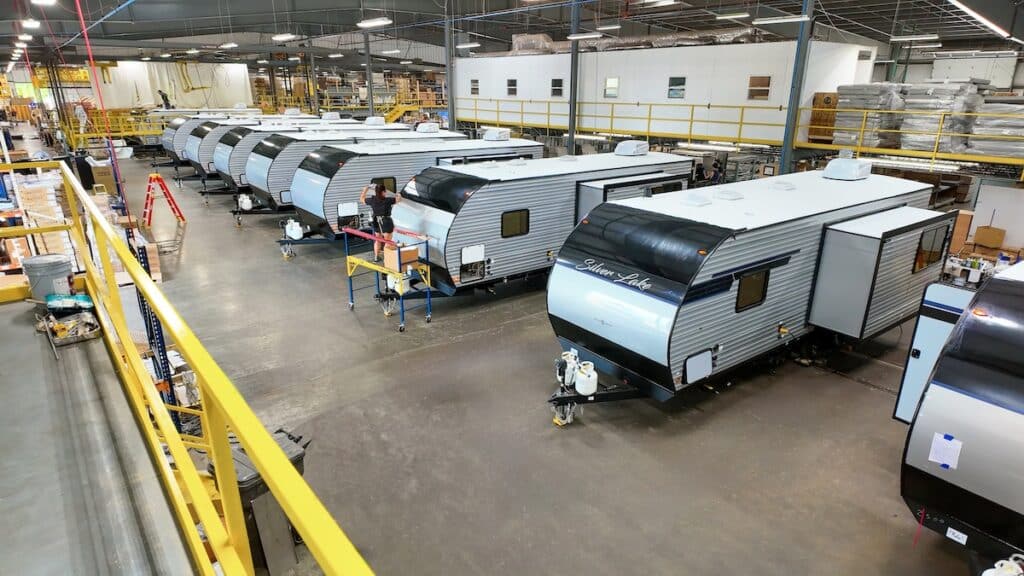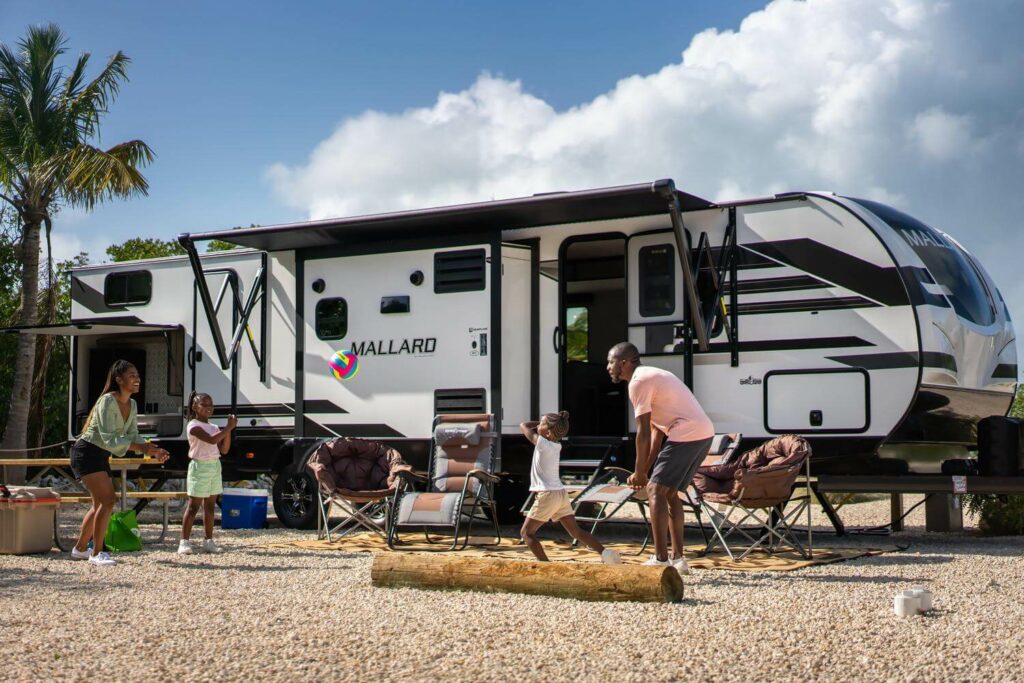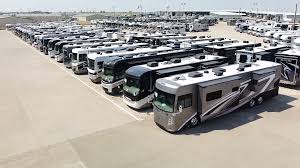As inflation lingers and economic uncertainty looms, the RV industry in 2025 continues to evolve—not retreat. From shifting consumer preferences to technological breakthroughs, this once-niche segment is proving it has staying power. Key RV industry trends such as the impact of economic recovery post-COVID-19, the rise of remote work, and the growing demand for sustainable technologies are shaping the market. Despite financial headwinds, RV demand during economic uncertainty is holding strong, and forward-thinking manufacturers and dealerships are adapting to drive the next wave of growth
Introduction to the RV Market
The RV industry has experienced significant growth in recent years, driven by several factors including the rise of remote work, a renewed interest in outdoor activities, and economic uncertainties. According to the RV Industry Association, shipments for 2024 are projected to range between 329,900 and 359,100 units, reflecting a continued rise in demand for RVs. This growth is expected to remain stable, with consumer demand driving sales and manufacturers responding with innovative and new designs. As the industry continues to evolve, RV owners and enthusiasts can look forward to advancements in technology, sustainability, and comfort, ensuring that the RV market remains vibrant and dynamic.
Resilient RV Industry Growth in 2025
While some sectors have faltered, the RV industry’s resilience has been shaped by its ability to meet lifestyle needs in real time. The post-pandemic RV growth that sparked during COVID-19 has not vanished—it’s diversified. People still crave mobile freedom, but with an emphasis on affordability, sustainability, and flexibility.
The shifting consumer behavior and market trends within the RV industry have also impacted 'RV travel,' with a noted decline in demand compared to previous years due to economic factors such as discretionary spending and consumer sentiment.
- Younger buyers in the RV market are reshaping demand with smaller, smarter rigs
- Retirees are trading large Class A motorhomes for compact RVs with low ownership costs, reflecting a significant demographic shift within the industry
- Rising interest rates are driving innovation in RV financing options in a tough economy
This blend of demographics is forcing a shift toward more versatile offerings that are attainable without sacrificing quality.

Market Shifts and Consumer Buying Trends
Economic headwinds haven’t slowed the desire to explore—they’ve changed the vehicle of choice. Key RV market shifts in 2025 include:
- Increased interest in affordable RV options such as teardrop trailers, pop-ups, and lightweight towables
- Continued growth in sustainable RV design trends, including solar integration, composting toilets, and energy-efficient materials. Modern RV designs also feature larger windows to enhance interior space and provide panoramic views.
- Expansion of digital retail in RV sales, as shoppers complete much of the buying process online. Sustainable RV design trends also include the adoption of LED lighting to enhance energy efficiency.
- Demand for budget RV trends and value-driven packages that offer function over flash, especially in new RVs
At Kunes RV, we’re seeing firsthand how RV lifestyle affordability and smart design are driving purchases—even among inflation-conscious consumers.
Digital Nomad Lifestyle
The digital nomad lifestyle is gaining momentum with many individuals and families embracing the freedom and flexibility that remote work offers. This shift has led to an increased demand for RVs that can accommodate remote workers, featuring reliable internet connectivity, comfortable workspaces, and ample storage for office equipment. As the digital nomad community continues to grow, RV manufacturers are responding with innovative designs and technologies that cater specifically to their needs. With the rise of remote work, the RV industry is poised for continued growth as people seek to combine travel and work in a way that is both productive and enjoyable.
Off Grid Capabilities
Off-grid capabilities are becoming increasingly important for RV owners who want to venture into remote locations and enjoy the great outdoors. Modern RVs are being designed with off-grid capabilities in mind, featuring solar panels, energy-efficient appliances, and advanced water storage systems. These innovations enable RV owners to stay off the grid for longer periods, reducing their environmental impact and increasing their sense of freedom and adventure. As the demand for off-grid capabilities continues to grow, RV manufacturers are investing in new technologies and designs that will allow RV owners to explore remote locations with confidence and comfort.

How RV Manufacturers Are Adapting
From component sourcing to factory workflows, RV manufacturers are adapting to the economy by:
- Streamlining models to focus on top-selling layouts
- Offering modular interiors and space-saving upgrades
- Incorporating eco-conscious materials and smart technology, including smart home integration
- Developing electric and hybrid-ready platforms to align with broader vehicle trends
This innovation has led to a new class of RVs that emphasize efficiency, sustainability, and a reduced cost of ownership—fitting the needs of today’s frugal-yet-adventurous buyer. Continuous improvement in customer experiences and processes is essential for sustaining demand and adapting to market pressures.
Economic Outlook for RV Dealerships
Despite a cooling economy, RV dealerships in 2025 are finding new ways to stay competitive. Dealers are implementing strategies such as:
- Stocking more entry-level and compact RVs to appeal to price-sensitive buyers
- Offering RV financing options for lower credit scores or extended terms
- Enhancing service offerings and mobile tech support for cost-effective ownership
- Expanding virtual tours, online trade-in tools, and contactless delivery options
At the dealer level, there is optimism among dealers despite challenges such as high interest rates and inflation. While sales may be softer than during the pandemic boom, there is still a positive sentiment regarding the future, particularly as they prepare for the upcoming year and respond to changing consumer demands.
At Kunes RV, we’re leveraging digital tools and personalized service to meet customers where they are—whether they’re first-time buyers or downsizing veterans.
RV Innovation During Downturns
Historically, economic downturns accelerate change—and the RV industry is no exception. Innovation in materials, layouts, and dealership experience is reshaping the landscape. Expect to see:
- Widespread adoption of solar-ready systems and battery storage
- Creative use of space with convertible furniture and modular kitchens
- Expanded use of smart tech, including app-controlled HVAC and power systems
- Broader access to compact RVs with luxury finishes
Standard features like smart home integration and advanced safety systems are becoming more common, enhancing the overall user experience and safety.
These changes aren’t just a response to economic pressure—they’re the foundation of the RV market’s future, indicating confidence in the market's long-term growth despite current challenges.

Kunes RV Market Insights
As one of the Midwest’s leading RV retailers, Kunes RV remains focused on what matters most: delivering value, flexibility, and innovation. Our 2025 strategy is built on understanding evolving demand, sourcing budget-friendly models, and offering exceptional financing support—even in uncertain times. In the RV business, adaptability and strategic planning are crucial to navigating economic fluctuations and preparing for future trends.
Various companies within the RV industry are experiencing growth and innovation, particularly those catering to the digital nomad lifestyle. These companies are adapting to market changes and capitalizing on trends, showcasing the importance of identifying market leaders and their impact on industry resilience and evolution.
We believe the future of the RV market is strong, as long as the industry stays responsive. For shoppers and industry professionals alike, the message is clear: RVing isn’t slowing down—it’s evolving.
Explore RVs built for today’s economy. Visit Kunes RV for expert guidance, financing options, and the latest in resilient RV industry growth and innovation.


